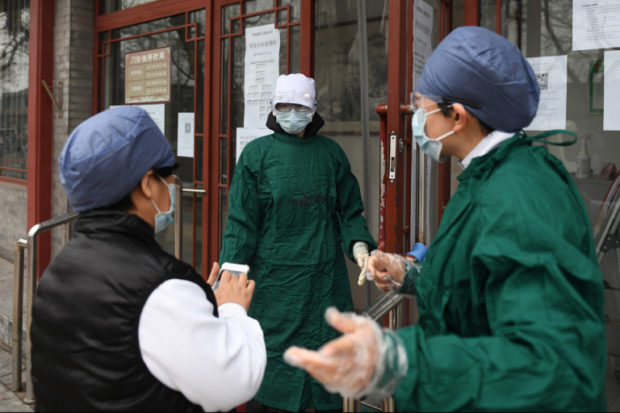
Medical staff wear face masks to protect against the COVID-19 coronavirus as they chat outside a hospital in Beijing on Feb. 20, 2020. Image: AFP/Greg Baker via AFP Relaxnews
New United Kingdom research has shown how being in quarantine, which is a common situation for many people around the world right now due to the current COVID-19 outbreak, could have a long-term effect on mental health.
Carried out by a team from King’s College London, the new research looked at 24 previous studies which had investigated the psychological impact of quarantine during previous disease outbreaks across ten countries, including Severe Acute Respiratory Syndrome (SARS), Ebola, H1N1 influenza, Middle East Respiratory Syndrome (MERS) and equine influenza.
The findings, published in The Lancet, showed that quarantine can produce a wide range of psychological effects, including post-traumatic stress symptoms, depression, feelings of confusion, anger and fear, and even substance misuse.
The team also added that some of these negative effects, most notably post-traumatic stress symptoms, can affect people long term and that health-care workers and those with a history of psychiatric disorder were most vulnerable to the effects.
Other factors that influenced the level of psychological impact on those in quarantine included, perhaps unsurprisingly, the length of time spent in quarantine, feelings of boredom, frustration, and fear, a lack of basic supplies such as food, water and clothes and a lack of quality information.
After having been quarantined, losing money due to stopping work and the stigma around the disease were also both linked to mental health problems.
Since the outbreak of the current COVID-19 outbreak, many countries have asked people to self-quarantine at or in a quarantine facility. The team commented that to help reduce the negative mental health effects during the outbreak, quarantine should last for no longer than necessary, health officials should provide clear information to those in quarantine, as well as sufficient supplies, and that the public should be reminded about the benefits of quarantine for the whole of society.
Lead author Dr. Samantha Brooks commented on the findings saying, “Going into quarantine is an isolating and often fearful experience and our study found that it has negative psychological effects. The finding that these effects can still be detected months or years down the line, albeit from a small number of studies, is of particular concern and indicates that measures should be put in place during the quarantine planning process to minimize these psychological impacts.”
“Our research suggests that health-care workers deserve special attention from their managers and colleagues and those with pre-existing poor mental health would need extra support during quarantine,” she added. JB
RELATED STORIES:
Daytime sleepiness in older adults could point to a higher risk of diabetes and cancer
Romantic attachment extremes may be associated with poor money management